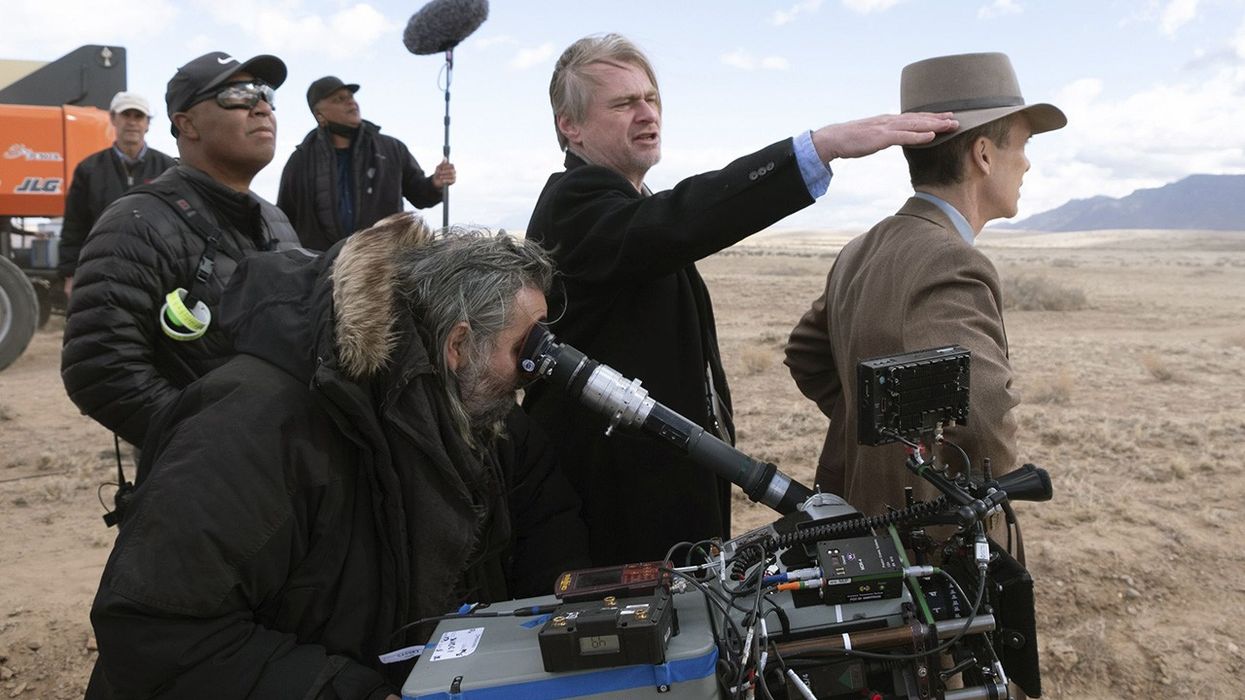How Christopher Nolan Shot His Most Ambitious IMAX Format Film Yet
A look behind-the-scenes of how Oppenheimer’s production blows past any previous IMAX film.

Look, it’s certainly no surprise that Christopher Nolan chose to shoot his latest (and perhaps his most ambitious) film in IMAX format. He’s shot IMAX for many of his films over the years (like Dunkirk for example). However, Nolan and his team have pulled out all of the stops for Oppenheimer.
We’ve already heard about how they had to invent a new IMAX film for Oppenheimer, as well as prints reportedly being 11 miles long and weighing over 600 pounds. Yet, these facts alone can not fully prepare audiences for what Nolan has up his sleeves for this epic biopic.
Let’s look behind the scenes of Oppenheimer to explore how Nolan, along with his cinematographer Hoyte Van Hoytema, has set Oppenheimer up to be his most ambitious IMAX format project yet.
Getting the IMAX Camera Close and Intimate
Let’s get this out of the way upfront here—it’s no small feat to shoot any film for IMAX. It takes humongous cameras, huge rolls of film, and gear that many production houses have never stocked before. Yet, the results speak for themselves and Nolan in particular knows the absolute power of the big and immersive IMAX screen.
From reports to the Associated Press, Oppenheimer was shot on an array of cameras including the IMAX MKII, Panavision Sphero 65 with Hasselblad Lenses IMAX MKIV, Panavision Sphero 65 and Hasselblad lenses IMAX MSM 9802, Panavision Sphero 65 and Hasselblad lenses Panavision Panaflex System 65 Studio, and, finally, Panavision System 65.
Yet, despite all of this explosive-minded gear and film, Nolan confesses that the goal of the project was to use this format as a way to better explore the close and intimate nature of the film’s protagonists and story.

Juxtaposing Color and Black and White
Another interesting quirk to Oppenheimer, which we’ll learn more about when the film releases here soon, is that a portion (perhaps a substantial part, too) is going to be in black-and-white. As we covered, this IMAX film had to be invented as 65 mm black-and-white IMAX film didn’t exist. It had to be created, tested, and produced for the first time for these sections of Oppenheimer.
In particular, it’s interesting that even Nolan himself and his crew had to test how this new footage was going to look on an actual IMAX screen before going into production. While color is lost, there’s something unique about black-and-white which can make the footage look almost more pristine and refined—if not at the very least timeless.
So, for those preferably sitting in IMAX theaters on July 21st, or even just watching it at home at some point in the future, audiences across the world will be seeing a new cinematic first, which is a rare thing for modern cinema history.
The Immersive Quality of IMAX
Perhaps the most fascinating elements of these behind-the-scenes featurettes coming out in support of Oppenheimer have to do with Nolan and co.’s absolute fanaticism about the immersive quality of IMAX footage being seen on the big screen.
To say there’s something lost when watching an IMAX format-shot film on a non-IMAX screen (or even worse, on your home TV, laptop, or smartphone) would be a huge understatement. (And you might find Nolan coming to your house to fight you.)
From real locations and hand-built sets to tons of practical effects and actual explosions, the focus of Oppenheimer’s production has been set on creating as much fantastic and realistic footage as possible. If Nolan’s track record is any indication, this new film with its new IMAX format footage behind it should be his most explosive yet.
What are your thoughts about Oppenheimer and its IMAX format production? Let us know your feelings in the comments below.











